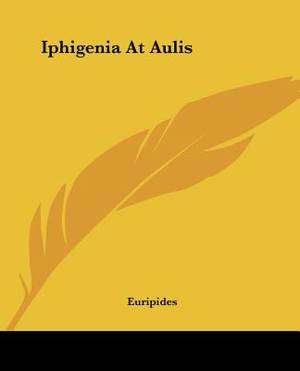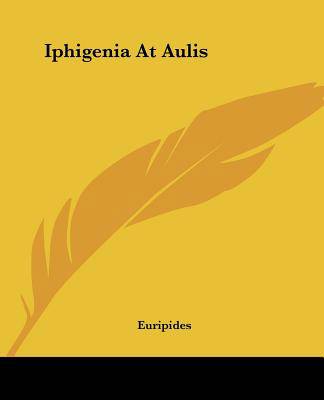
Door een staking bij bpost kan je online bestelling op dit moment iets langer onderweg zijn dan voorzien. Dringend iets nodig? Onze winkels ontvangen jou met open armen!
- Afhalen na 1 uur in een winkel met voorraad
- Gratis thuislevering in België vanaf € 30
- Ruim aanbod met 7 miljoen producten
Door een staking bij bpost kan je online bestelling op dit moment iets langer onderweg zijn dan voorzien. Dringend iets nodig? Onze winkels ontvangen jou met open armen!
- Afhalen na 1 uur in een winkel met voorraad
- Gratis thuislevering in België vanaf € 30
- Ruim aanbod met 7 miljoen producten
Zoeken
Omschrijving
Iphigenia at Aulis is a Greek tragedy written by Euripides. It tells the story of Agamemnon, the king of Mycenae, who is preparing to lead the Greek army to war against Troy. However, the goddess Artemis is angry with Agamemnon and demands that he sacrifice his daughter, Iphigenia, to appease her. Agamemnon is torn between his duty as a king and his love for his daughter, and he struggles to make a decision. Meanwhile, Iphigenia and her mother, Clytemnestra, arrive at Aulis, where the Greek army is waiting, unaware of the true reason for their presence. The play explores themes of sacrifice, duty, and the consequences of war. In the end, Agamemnon decides to sacrifice Iphigenia, and she willingly accepts her fate, becoming a tragic heroine.CLYTAEMNESTRA: I am not so void of sense; bethink thee, I shall go through this as well, when I lead the maiden from the chamber to the sound of the marriage-hymn; wherefore I chide thee not; but custom will combine with time to make the smart grow less.This scarce antiquarian book is a facsimile reprint of the old original and may contain some imperfections such as library marks and notations. Because we believe this work is culturally important, we have made it available as part of our commitment for protecting, preserving, and promoting the world's literature in affordable, high quality, modern editions, that are true to their original work.
Specificaties
Betrokkenen
- Auteur(s):
- Uitgeverij:
Inhoud
- Aantal bladzijden:
- 72
- Taal:
- Engels
Eigenschappen
- Productcode (EAN):
- 9781419126673
- Verschijningsdatum:
- 17/06/2004
- Uitvoering:
- Paperback
- Formaat:
- Trade paperback (VS)
- Afmetingen:
- 190 mm x 235 mm
- Gewicht:
- 140 g

Alleen bij Standaard Boekhandel
+ 54 punten op je klantenkaart van Standaard Boekhandel
Beoordelingen
We publiceren alleen reviews die voldoen aan de voorwaarden voor reviews. Bekijk onze voorwaarden voor reviews.











